

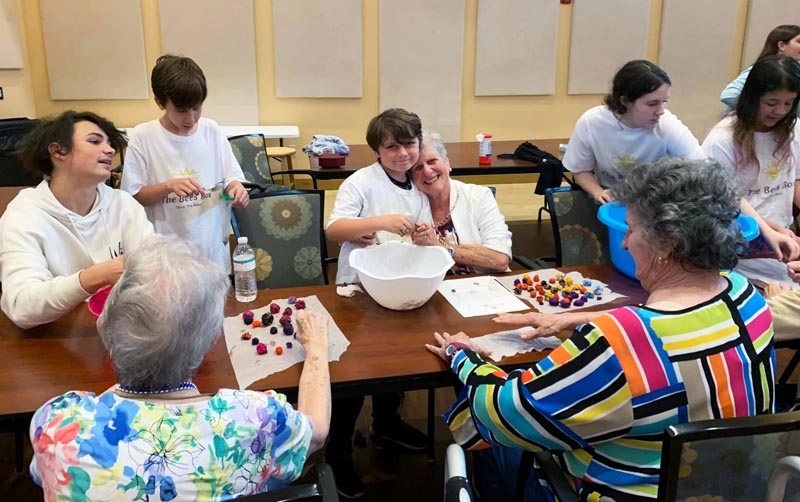

By Leslie Farrell
Friendship. That was the theme for the first week at the Baha’i-inspired bilingual Service Learning Micro-School upon opening in August in Tampa, Florida.
To demonstrate the virtue of friendliness, teacher Crishawn Floyd, principal Jaime Manfra and the six kindergarten students baked sugar cookies for the staff at the University Area Community Center, where the school is based. The children measured and counted ingredients (math component), decorated them (art component), wrote an accompanying note (language component) and walked them over to the organization’s receptionist.
Founded by Manfra, the Learning Service Micro-School is unique in the area. Its bilingual curriculum is based on learning through service with inspiration from Baha’i teachings.
Personal greetings each morning
All the children live in the neighborhood and walk to school. Floyd greets each parent and student as they arrive, and the children put their backpacks in cubbies. They can begin using worksheets that await on their desks, or can visit “learning centers” in science, art, reading and home economics.
Class officially begins at 8:30 a.m. with circle time, during which children review the alphabet and discuss the weather in both English and Spanish.
The rest of the day includes snack and lunch times, recess and nap times, silent and shared reading, math in the form of games and centers, music, and group art lessons. These components are often woven into service projects.
Throughout the day, Baha’i values are incorporated into the studies and activities, with concentration on the week’s chosen virtue such as kindness, generosity or cooperation.
Virtues are a central theme in the books, curriculum and culture within the classroom. Materials from Brilliant Star, a Baha’i-published children’s magazine, are an integral part of the micro-school.
All lessons are taught bilingually. Some of the students speak English and some Spanish as their primary languages.
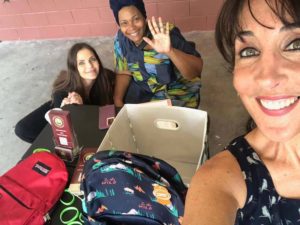

A model based on empowerment
Micro-schools are designed to empower teachers, parents and families, Manfra says. Teachers are trained professionals, and in micro-schools, they have autonomy over their classrooms.
Relationships, and even friendships, with parents are encouraged. “We take it seriously that these parents trust their kids to us. We don’t take that lightly,” Manfra says. “It all boils down to trust and proximity. We intentionally build friends and communication from the very beginning, so we can work together for the progress of the student.”
Smaller schools are healthier environments, both physically and emotionally, she says. The social discomfort of being unseen, which can happen in a big school, can lead to violence and aggression, Manfra points out. That feeling of invisibility can never happen in a micro-school, where everyone knows each other well.
Children in smaller classes progress more quickly academically, Manfra says, adding that all talents are nurtured.
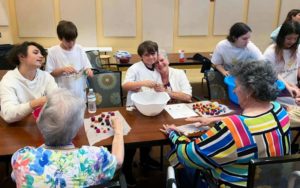

The Baha’i concept of service is at the core of the Service Learning Micro-School, and students spend a great deal of time in service to humanity. A few projects planned for these students include weekly volunteering at the local garden and neighborhood market, decorating and distributing “kindness rocks,” yard work for elderly neighbors, hosting projects that benefit local animal shelters, and even using their school kitchen to create healthy dishes and treats for neighbors in need.
Growing through conversation
While only six students attend the Tampa school as of fall 2021, the school can accommodate up to 12. Awareness of the school is spreading through word of mouth, door-to-door visits, media coverage and neighborhood meetings.
The University Area Community Development Corporation has helped with recruitment and resources. One family joined the school after meeting Manfra in the organization’s community garden at Harvest Hope Park, one of the places where students volunteer.
“We don’t promote a particular religion, but we don’t prevent discussions about spirituality or God,” Manfra said, adding that their website does mention the school is based on Baha’i principles. “Parents like the service aspect, the accessibility to their child and teacher. They love the feel and energy of the school.”
Beyond educating children, the school also aims to inspire teachers to open more of these schools. When teachers run their own schools, they gain capacity with entrepreneurship, as well as financial literacy: balancing budgets, monitoring scholarship money, etc.


Beginnings in Clearwater
Manfra herself began in this manner. She was a mother in a neighborhood with many children. She was home with her sons and neighborhood children gathered at her house. With encouragement from other parents and the Baha’i community, she opened the first Service Learning Micro-School in her hometown of Clearwater.
The school Manfra started nine years ago has grown from six students to 48. High schoolers participate in dual enrollment with St. Petersburg College, typically enabling them to finish high school with college credits.
Tuition runs between $6,000 to $12,000 per child at these private schools, but families pay nothing. All tuition is covered through donations and school fundraisers.
Baha’i principles are infused into the educational environment. All books and content are virtue-themed and everything ties to respect and kindness. Children and teachers continually discuss how they can help the community.
The Faith teaches that children should be continually encouraged and made eager to learn, and that is a goal at both schools, Manfra says. “We don’t use shameful or penal discipline; we use restorative justice, even with teens. Everything we do is guided by the principles.”
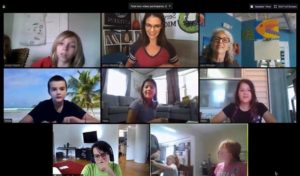

At the Clearwater school, weekly junior youth group meetings and children’s spiritual education classes are incorporated into the curriculum. Several students who are not from Baha’i families have participated in ongoing study circles with Baha’i-inspired training materials.
Local Baha’i support
The local Baha’i community has been crucial to the school’s development. Baha’is from neighboring counties frequently visit the school, participate in service projects and invite parents to attend events and holy day celebrations. Through this encouragement and accompaniment over the years, many friendships have blossomed between school parents and Baha’is.
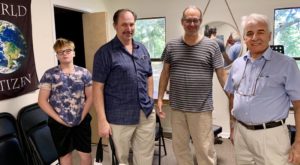

The consistent Baha’i presence around school activities is imperative to maintaining bonds of unity and trust, Manfra says. The natural evolution of this effort was the participation of some school parents and students in Baha’i community-building activities.
Some students have also joined a Baha’i chorus, learning songs together and participating in several Baha’i holy day celebrations.
When the world experienced school closures due to COVID-19, micro-school parents and Baha’is continued conversations through small-group meetings and Zoom conversations. The school continued to host junior youth group meetings virtually, involving students alongside young people in the Baha’i community.
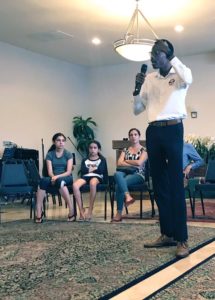

At the same time, “Our focus with parents, students and Baha’i friends shifted to understanding anti-Blackness in America,” Manfra says.
As friendships continued to deepen around Baha’i guidance on race unity, the plan for the second micro-school in Tampa emerged.
The school is governed by a six-member board that includes three Baha’is. The board engages the students and their families in meaningful conversations, acts as a teacher support system, and serves as a conduit between the Tampa micro-school, the greater community and the Baha’i community.


![]()
![]()
Whether you are exploring the Bahá'í Faith or looking to become an active member, there are various ways you can connect with our community.
Please ensure that all the Required Fields* are completed before submitting.